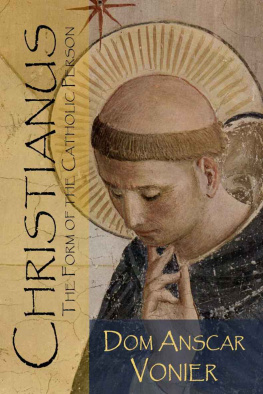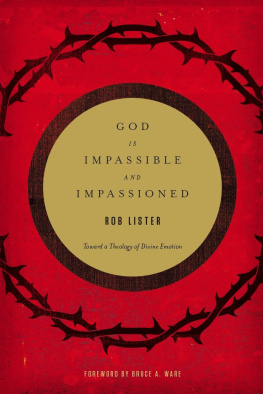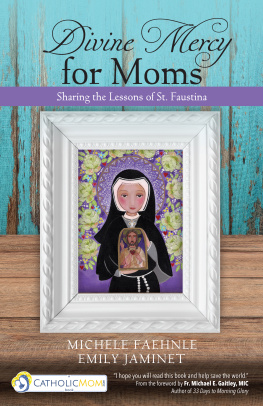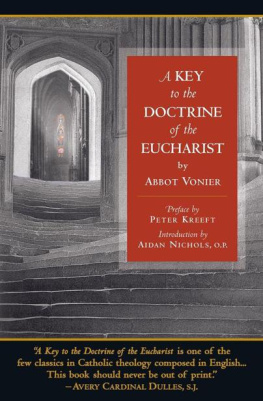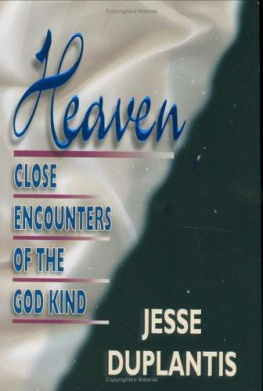THE DIVINE MOTHERHOOD
BY
DOM ANSCAR VONIER, O.S.B.
ABBOT OF BUCKFAST

2014
Nihil Obstat.
Henricus Davis, S.J., Censor Deputatus.
Imprimatur.
Edm. Can. Surmont, Vicarius Generalis.
Westminster
December 13, 1920
The Nihil Obstat and Imprimatur are official declarations that a book or pamphlet is free of doctrinal or moral error. No implication is contained therein that those who have granted the Nihil Obstat and the Imprimatur agree with the content, opinions or statements expressed.
This book was originally published in 1921 by B. Herder.
Copyright 2014 Assumption Press. All rights reserved
Cover image: Stained glass panel in the transept of St. Johns Anglican Church, Ashfield, New South Wales. Photo: Toby Hudson, 2009. Available under the Creative Commons Attribution-Share Alike licenxe.
Contents
Foreword
There is not a controversial word in this book. It is written for the believer who accepts the full theology of the Incarnation.
It is a difficult thing for our mind to place itself in an atmosphere so serene as not to take account of the fact that there have been heresies. Yet I think that anyone who wants to enjoy his faith in the Incarnation as fully as it is possible here on earth must pay no attention to heresy and must practically ignore its existence. The positive side of our theology of the Incarnation is so wonderful, so immense, that the mind can find untold satisfaction in its contemplation, without in the least feeling the need of looking at the negative side, the contradiction. It is with this sense of undisturbed spiritual possession that this book on the Blessed Mother of God is written, for people who no more doubt the fact that the Son of God is the Son of Mary, than the fact that they were born of their own respective mothers. Human motherhood is the easiest as well as the sweetest subject of mans speech; let divine maternity be as natural and as obvious a truth to us who believe in the Incarnation.
Anscar Vonier, O. S. B., Abbot
Buckfast Abbey, May 1921.
I
Marys Personal Sanctity
It is possible for us to make the distinction between our Ladys personal sanctity and our Ladys divine motherhood. Her immaculate conception, her absolute sinlessness, her immense charity, may be considered as her personal sanctity. She was already endowed with this personal sanctity when the Archangel Gabriel approached her with his message of infinite import: Hail, full of grace, the Lord is with thee; blessed art thou among women (Luke 1:28). Great as was Marys sanctity at that moment, the moment that preceded her divine motherhood, there is nothing that could compel us to say that such sanctity could not be granted by God to a human being quite irrespective of the mystery of the divine motherhood. God could grant the privilege of immaculate conception and the privilege of absolute sinlessness in soul and body to anyone born from Adam.
The words of the heavenly spirit are the picture of Marys soul such as it was before the mystery of the Incarnation lifted that soul to an entirely new plane of sanctity and perfection. The Angels words have reference to Marys actual state, the spotless angel meets the spotless woman.
In a memorable passage of the Gospels we find this distinction between Marys divine motherhood and her personal sanctity made use of by Christ Himself in order to enhance the importance of personal sanctity:
And it came to pass, as he spoke these things, a certain woman from the crowd, lifting up her voice, said to him: Blessed is the womb that bore thee, and the paps that gave thee suck. But he said: Yea rather, blessed are they who hear the word of God, and keep it (Luke 11:27-28).
This contrasting between the divine motherhood and personal sanctity by the Son of God Himself is, no doubt, one of the most telling things in the sacred Gospels.
The circumstance that we owe this passage to St. Luke is not without its value; St. Luke is the Evangelist of the divine motherhood above the other Evangelists, and we have here the last of the three blessings on Marys head enumerated by him, the first being found in Gabriels salutation, and the second in the greeting with which Elizabeth met her cousin. Nothing in the world could give us a more exalted view of the value and nature of personal sanctity than the rejoinder of our Lord to the womans encomium on the divine motherhood. We were in need of this great lesson as nothing is more difficult to man than a practical love and appreciation of the things that constitute personal sanctity. The most exalted spiritual marvel, by the very laws of the divine life, intimately connected with personal sanctity.
But nothing, on the other hand, would be less justifiable than to read into our Lords words the least depreciation of the worth of the divine motherhood, as such. He emphasizes the value of personal sanctity by means of the highest created form of comparison, the divine motherhood. It would be quite futile to ask ourselves the question whether divine motherhood could be separated in practice from personal sanctity; in other words, whether it is on the whole possible for a creature to be the Mother of God, and yet to be deprived of personal sanctity. No doubt, such a thing implies a contradiction. Certainly our Lords words by no means suggest that in His mind He made such a supposition. He admits fully the praise bestowed on the divine motherhood, but He completes the encomium by extending it to personal sanctity.
The distinction we make between our Ladys personal sanctity and her divine motherhood is justified on the ground that it would be possible, speaking theoretically, for a human being to have as much grace as Mary had independently of the divine motherhood. But the matter may be put in another form, and we may ask ourselves whether divine motherhood is at all possible without personal sanctity, and personal sanctity of a very high degree. We feel, of course, instinctively, that the Mother of God ought to be a very holy being; but to what extent personal sanctity and divine maternity are inseparable, it is not so easy for us to decide. From the sacred Gospels and from Catholic theology we learn a vast amount as to the nature and the extent of the divine motherhood. We know a good deal, too, from faith and tradition, concerning our Ladys personal sanctity; we know her to have been conceived immaculate, to have been absolutely sinless, to have been confirmed in grace. But to what extent these personal privileges were postulated by the divine motherhood we cannot say so readily.
There is, however, one spiritual fact of absolute certainty: the divine motherhood is the primary, the central fact in Marys election and predestination on the part of God. She is not a saint to whom divine motherhood was bestowed as an extra grace; she is the divine Mother to whom sanctity has been granted as a necessary spiritual complement. Divine motherhood is a grace, or rather, a spiritual marvel so prodigious, so unique in its nature, that it must be considered as the all overpowering spiritual factor in the person who receives it. All other endowments of soul and body in that ever-blessed person could not be anything except a preparation for, and a sequel to, that great mystery of divine life. So though we fail to see whether sanctity of the highest degree is united with divine motherhood through a necessary law of life, one thing we cannot fail to see is this priority of the divine motherhood in Marys election; she is simply the Mother of God; such is the definition of Mary.
Now if this little book is to have achieved anything, the reader ought not to lay it aside, after perusing it, without having gained such a view of the excellency of the divine motherhood as to have made it a necessity for his mind to admit that Marys personal sanctity was intrinsically connected with her maternity through a law of supernatural life which God Himself could not have suspended.
Next page

